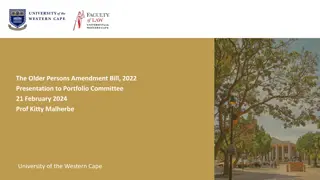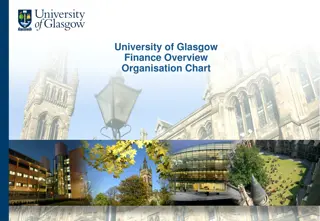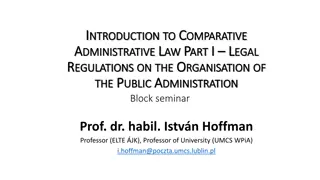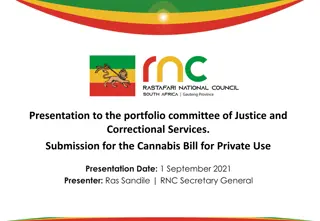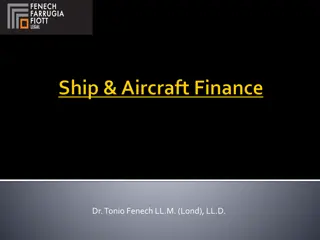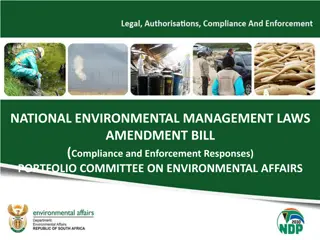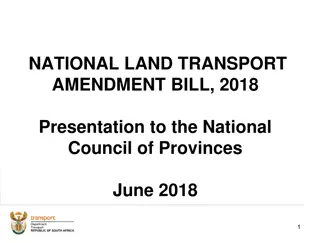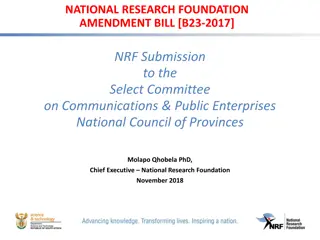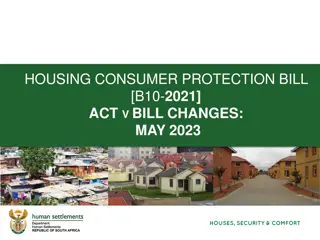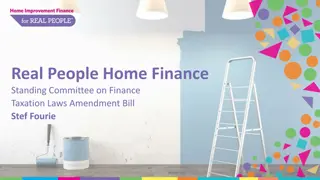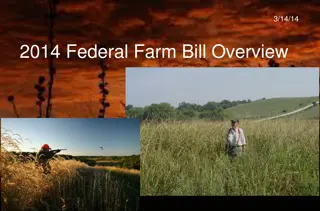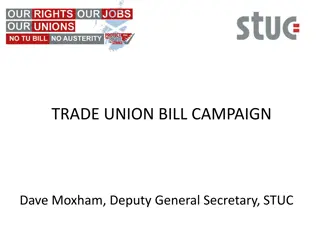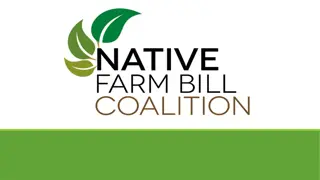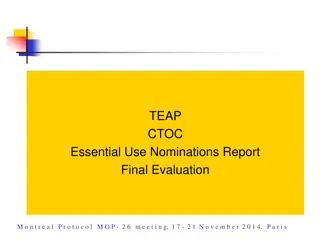Comparison of Old and New Reassessment Provisions in Finance Bill 2021
The Finance Bill 2021 introduces new reassessment provisions impacting the assessment of income chargeable to tax. Key changes include the amendment of Section 147 and the addition of Section 148, affecting the Assessing Officer's powers and procedures. These modifications aim to streamline the assessment process and enhance tax compliance. Furthermore, the Explanation 3 under the new provisions allows for assessing or reassessing income issues that were previously unaddressed. The comparison highlights the alterations in the legal framework governing income tax assessments.
Download Presentation

Please find below an Image/Link to download the presentation.
The content on the website is provided AS IS for your information and personal use only. It may not be sold, licensed, or shared on other websites without obtaining consent from the author. Download presentation by click this link. If you encounter any issues during the download, it is possible that the publisher has removed the file from their server.
E N D
Presentation Transcript
NEW REASSESSMENT PROVISIONS FINANCE BILL 2021 SURAJ BHAN NAIN Advocate Former Chief Commissioner of Income Tax Email: surajnain@hotmail.com Mob.: 9468400600
OLD PROVISIONS NEW PROVISIONS 147. If the Assessing Officer has reason to believe* that any income chargeable to tax has escaped assessment for any assessment year, he may, subject to the provisions of sections 148 to 153, assess or reassess such income and also any other income chargeable to tax which has escaped assessment and which comes to his notice subsequently in the course of the proceedings under this section, or recompute the loss or the depreciation allowance or any other allowance, as the case may be, for the assessment year concerned (hereafter in sections 148 to 153 referred to as the relevant assessment year) : 147. If any income chargeable to tax, in the case of an assessee, has escaped assessment for any assessment year, the Assessing Officer may, subject to the provisions of sections 148 to 153, assess or reassess such income or recompute the loss or the depreciation allowance or any other allowance or deduction for such assessment year (hereafter in this section and in sections 148 to 153 referred to as the relevant assessment year). in this section and *[for reasons to be recorded by him in writing, is of the opinion] ITO v. Lakhmani Mewal Das [1976] 103 ITR 437(SC) direct nexus or live link between the material coming to the notice of the Income- tax Officer and the formation of his belief CIT v. Kelvinator of India Ltd. [2010] 320 ITR 561/ 187 Taxman 312 (SC) ITO 361/255Taxman152 (SC) v. Tech Span India (P) Ltd. [2018] 404 ITR 10/92 taxmann.com Change of opinion: Ganga Saran & Sons (P) Ltd. v. ITO [1981] 130 ITR 1/6 Taxman 14 (SC) Stronger than is satisfied
Explanation 3.For the purpose of assessment or reassessment under this section, the Assessing Officer may assess or reassess the income in respect of any issue, which has escaped assessment, and such issue comes to his notice subsequently in the course of the proceedings under this section, notwithstanding that the reasons for such issue have not been included in the reasons recorded under sub-section (2) of section 148. Explanation. For the purpose of assessment or reassessment under this section, the Assessing Officer may assess or reassess the income in respect of any issue, which has escaped assessment, issue comes subsequently in the course of the proceedings under this section, irrespective of the fact that the provisions of section 148A have not been complied with. and his such notice to Except above Explanation-3, three proviso and Explanation 1,2 & 4 are not appearing in new section
New Section 148: 148. Before making the assessment, reassessment or recomputation under section 147, and subject to the provisions of section 148A, the Assessing Officer shall serve on the assessee a notice, along with a copy of the order passed, if required, under clause (d) of section 148A, requiring him to furnish within such period, as may be specified in such notice, a return of his income or the income of any other person in respect of which he is assessable under this Act during the previous year corresponding to the relevant assessment year, in the prescribed form and verified in the prescribed manner and setting forth such other particulars as may be prescribed; and the provisions of this Act shall, so far as may be, apply accordingly as if such return were a return required to be furnished under section 139: Provided that no notice under this section shall be issued unless there is information with the Assessing Officer which suggests that the income chargeable to tax has escaped assessment in the case of the assessee for the relevant assessment year and the Assessing Officer has obtained prior approval of the specified authority to issue such notice.
Section 148 continues. Explanation 1. For the purposes of this section and section 148A, the information with the Assessing Officer which suggests that the income chargeable to tax has escaped assessment means, (i) any information flagged in the case of the assessee for the relevant assessment year in accordance with the risk management strategy formulated by the Board from time to time; (ii) any final objection raised by the Comptroller and Auditor General of India to the effect that the assessment in the case of the assessee for the relevant assessment year has not been made in accordance with the provisions of this Act. India and Eastern Newspaper Society v. CIT [1979] 119 ITR 996/ 2 Taxman 197(SC) CIT v. PVS Beedies (P) Ltd. [1999]237 ITR 13/103 Taxman 294 (SC) CAG is not Income tax Authority u/s 116 of The Income Tax Act
Section 148 continues. Explanation 2. For the purposes of this section, where, a search is initiated under section 132 or books of account, other documents or any assets are requisitioned under section 132A, on or after the 1st day of April, 2021, in the case of the assessee; or (ii) a survey is conducted under section 133A in the case of the assessee on or after the 1st day of April, 2021; or (iii) the Assessing Officer is satisfied, with the prior approval of the Principal Commissioner or Commissioner, that any money, bullion, jewellery or other valuable article or thing, seized or requisitioned in case of any other person on or after the 1st day of April, 2021, belongs to the assessee; or (iv) the Assessing Officer is satisfied, with the prior approval of Principal Commissioner or Commissioner, that any books of account or documents, seized or requisitioned in case of any other person on or after the 1st day of April, 2021, pertains or pertain to, or any information contained therein, relate to, the assessee, the Assessing Officer shall be deemed to have information which suggests that the income chargeable to tax has escaped assessment in the case of the assessee for the three assessment years immediately preceding the assessment year relevant to the previous year in which the search is initiated or books of account, other documents or any assets are requisitioned or survey is conducted in the case of the assessee or money, bullion, jewellery or other valuable article or thing or books of account or documents are seized or requisitioned in case of any other person. Explanation.3 For the purposes of this section, specified authority means the specified authority referred to in section 151. . (i)
148A. The Assessing Officer shall, before issuing any notice under section 148, conduct any enquiry, if required, with the prior approval of specified authority, with respect to the information which suggests that the income chargeable to tax has escaped assessment; (a) provide an opportunity of being heard to the assessee, with the prior approval authority, by serving upon him a notice to show cause within such time, as may be specified in the notice, being not less than seven days and but not exceeding thirty days from the date on which such notice is issued, or such time, as may be extended by him on the basis of an application in this behalf, as to why a notice under section 148 should not be issued on the basis of information which suggests that income chargeable to tax has escaped assessment in his case for the relevant assessment year and results of enquiry conducted, if any, as per clause (a); of specified (b) consider the reply of assessee furnished, if any, in response to the show-cause notice referred to in clause (b); (c) decide, on the basis of material available on record including reply of the assessee, whether or not it is a fit case to issue a notice under section 148, by passing an order, with the prior approval of specified authority, within one month from the end of the month in which the reply referred to in clause (c) is received by him, or where no such reply is furnished, within one month from the end of the month in which time or extended time allowed to furnish a reply as per clause (b) expires: (d) [G K N Driveshafts (India) Ltd. v. ITO (259 ITR 19 (SC)]
Section 148A continues.. Provided that the provisions of this section shall not apply in a case where, a search is initiated under section 132 or books of account, other documents or any assets are requisitioned under section 132A in the case of the assessee on or after the 1st day of April, 2021; or (a) the Assessing Officer is satisfied, with the prior approval of the Principal Commissioner or Commissioner that any money, bullion, jewellery or other valuable article or thing, seized in a search under section 132 or requisitioned under section 132A, in the case of any other person on or after the 1st day of April, 2021, belongs to the assessee; or (b) the Assessing Officer is satisfied, with the prior approval of the Principal Commissioner or Commissioner that any books of account or documents, seized in a search under section 132 or requisitioned under section 132A, in case of any other person on or after the 1st day of April, 2021, pertains or pertain to, or any information contained therein, relate to, the assessee. (c) Explanation. For the purposes of this section, specified authority means the specified authority referred to in section 151. .
149. (1) No notice under section 148 shall be issued for the relevant assessment year, if three years have elapsed from the end of the relevant assessment year, unless the case falls under clause (b); (a) if three years, but not more than ten years, have elapsed from the end of the relevant assessment year unless the Assessing Officer has in his possession books of accounts or other documents or evidence which reveal that the income chargeable to tax, represented in the form of asset, which has escaped assessment amounts to or is likely to amount to fifty lakh rupees or more for that year: (b) Provided that no notice under section 148 shall be issued at any time in a case for the relevant assessment year beginning on or before 1st day of April, 2021, if such notice could not have been issued at that time on account of being beyond the time limit specified under the provisions of clause (b) of sub-section (1) of this section, as they stood immediately before the commencement of the Finance Act, 2021: Provided further that the provisions of this sub-section shall not apply in a case, where a notice under section 153A, or section 153C read with section 153A, is required to be issued in relation to a search initiated under section 132 or books of account, other documents or any assets requisitioned under section 132A, on or before the 31st day of March, 2021:
Section 149 continues. Provided also that for the purposes of computing the period of limitation as per this section, the time or extended time allowed to the assessee, as per show-cause notice issued under clause (b) of section 148A or the period during which the proceeding under section 148A is stayed by an order or injunction of any court, shall be excluded: Provided also that where immediately after the exclusion of the period referred to in the immediately preceding proviso, the period of limitation available to the Assessing Officer for passing an order under clause (d) of section 148A is less than seven days, such remaining period shall be extended to seven days and the period of limitation in sub-section (1) shall be deemed to be extended accordingly. (2) The provisions of sub-section (1) as to the issue of notice shall be subject to the provisions of section 151.
151. Specified authority for the purposes of section 148 and section 148A shall be, Principal Commissioner or Principal Director or Commissioner or Director, if three years or less than three years have elapsed from the end of the relevant assessment year; (i) (ii) Principal Chief Commissioner or Principal Director General or where there is no Principal Chief Commissioner or Principal Director General, Chief Commissioner or Director General, if more than three years have elapsed from the end of the relevant assessment year. .
In ITO v. Lakhmani Mewal Das [1976] 103 ITR 437(SC), the Hon'ble Supreme Court while interpreting the provisions of section 147 of the Act held as under: ". . . the reasons for the formation of the belief must have a rational connection with or relevant bearing on the formation of the belief. Rational connection postulates that there must be a direct nexus or live link between the material coming to the notice of the Income-tax Officer and the formation of his belief that there has been escapement of the income of the assessee from assessment in the particular year because of his failure to disclose fully and truly all material facts. It is no doubt true that the Court cannot go into the sufficiency or adequacy of the material and substitute its own opinion for that of the Income-tax Officer on the point as to whether action should be initiated for reopening assessment. At the same time we have to bear in mind that it is not any and every material, howsoever vague and indefinite or distant, remote and farfetched, which would warrant the formation of the belief relating to escapement of the income of the assessee from assessment. The fact that the words 'definite information' which were there in section 34 of the Act of 1922, at one time before its amendment in 1948, are not there in section 147 of the Act of 1961, would not lead to the conclusion that action can now be taken for reopening assessment even if the information is wholly vague, indefinite, far-fetched and remote. The reason for the formation of the belief must be held in good faith and should not be a mere pretence." (p. 448) The Hon'ble Supreme Court in the case of Ganga Saran & Sons (P.) Ltd. v. ITO [1981] 130 ITR1/ 6 Taxman 14 (SC) held that "reason to believe" is much stronger than "being satisfied" and observed as under: "The important words under section 147(a) are "has reason to believe" and these words are stronger than the words "is satisfied". The belief entertained by the ITO must not be arbitrary or irrational."
CIT v. Kelvinator of India Ltd. [2010] 320 ITR 561/ 187 Taxman 312(SC) "4. 1987, re-opening could be done under above two conditions and fulfilment of the said conditions alone conferred jurisdiction on the Assessing Officer to make a back assessment, but in section 147 of the Act [with effect from 1-4-1989], they are given a go-by and only one condition has remained, viz., that where the Assessing Officer has reason to believe that income has escaped assessment, confers jurisdiction to re-open the assessment. Therefore, post 1-4-1989, power to reopen is much wider. However, one needs to give a schematic interpretation to the words "reason to believe" failing which, we are afraid, section 147 would give arbitrary powers Officer to re-open assessments on the basis of "mere change of opinion", which cannot be per se reason to reopen. We must also keep in mind the conceptual difference between power to review and power to re-assess. The Assessing Officer has no power to review; he has the power to reassess. But reassessment has to be based on fulfilment of certain pre-condition and if the concept of "change of opinion" is removed, as contended on behalf of the Department, then, in the garb of re-opening the assessment, review would take place. One must treat the concept of "change of opinion" as an in-built test to check abuse of power by the Assessing Officer. Hence, after 1-4- 1989, Assessing Officer has power to reopen, provided there is "tangible material" to come to the conclusion that there is escapement of income from assessment. Reasons must have a live link with the formation of the belief. Our view gets made to section 147 of the Act, as quoted hereinabove. Under the Direct Tax words "reason to believe" but also inserted the word "opinion" in section 147 of the Act. However, on receipt of representations from the Companies against omission of the words "reason to believe", Parliament re-introduced the said expression and deleted the word "opinion" on the ground that it would vest arbitrary powers in the Assessing Officer. We quote hereinbelow the relevant portion of Circular No. 549, dated 31-10-1989, which reads as follows : On going through the changes, quoted above, made to section 147 of the Act, we find that, prior to Direct Tax Laws (Amendment) Act, to the Assessing support from the changes Laws (Amendment) Act, 1987, Parliament not only deleted the "7.2 Amendment made by the Amending Act, 1989, to reintroduce the expression 'reason to believe' in section 147. A number of representations were received against the omission of the words 'reason to believe' from section 147 and their substitution by the 'opinion of the Assessing Officer. It was pointed out that the meaning of the expression, 'reason to believe' had been explained in a number of court rulings in the past and was well settled and its omission from section 147 would give arbitrary powers to the Assessing Officer to reopen past assessments on mere change of opinion. To allay these fears, the Amending Act, 1989, has again amended section 147 to reintroduce the expression 'has reason to believe in place of the words 'for reasons to be recorded by him in writing, is of the opinion . Other provisions of the new section 147, however, remain the same." [Emphasis supplied] 5. costs." For the aforestated reasons, we see no merit in these civil appeals filed by the Department, hence, dismissed with no order as to
India and Eastern Newspaper Society v. CIT [1979] 119 ITR 996/ 2 Taxman 197 (SC) had examined the issue of audit objection raised by the internal audit party or by the C&AG being information for purpose of section 147(b) and held that audit objection raised by both do not constitute information for the purpose of section 147(b) and observed as under: "Whether it is the internal audit party of the Income-tax Department or an audit party of the Comptroller and Auditor-General, they perform essentially administrative or executive functions, and cannot be attributed the power of judicial supervision over the quasi-judicial acts of income-tax authorities. The Income-tax Act does not contemplate such power in any internal audit organisation of the Income-tax Department; it recognises it in those authorities only which are specifically authorised to exercise adjudicatory functions. Nor does section 16 of the Comptroller and Auditor-General's (Duties, Powers and Conditions of Service) Act, 1971, envisages such a power for the attainment of the objectives incorporated therein. Neither statute supports the conclusion that an audit party can pronounce on the law, and that such pronouncement amounts to "information" within the meaning of section 147(b) of the Income-tax Act, 1961."
SURAJ BHAN NAIN Advocate Former Chief Commissioner of Income Tax Email: surajnain@hotmail.com Mob.: 9468400600

 undefined
undefined

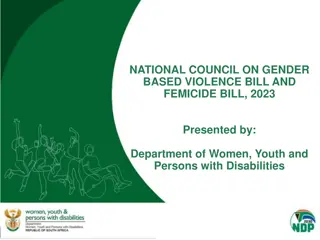
![Prevention and Combating of Hate Crimes and Hate Speech Bill [B.9B.2018]](/thumb/60513/prevention-and-combating-of-hate-crimes-and-hate-speech-bill-b-9b-2018.jpg)
